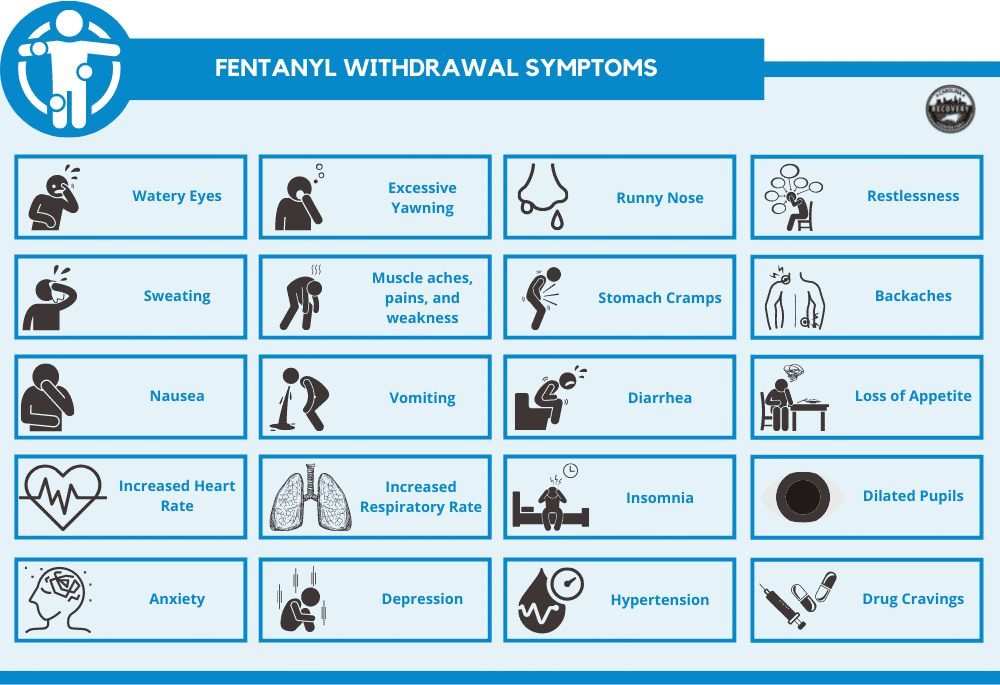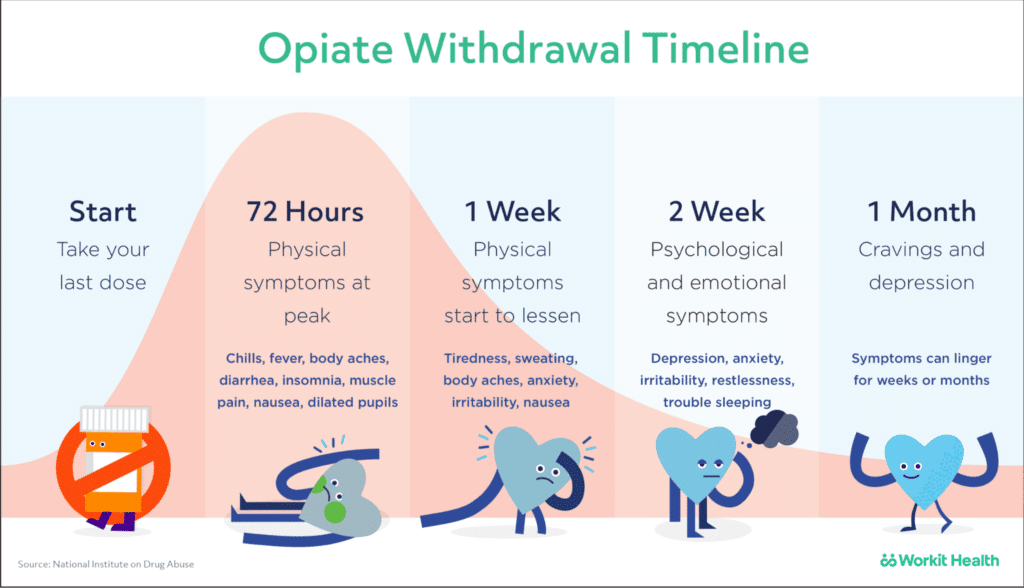Even by fluke, Fentanyl can become life-threatening, just like Benzos. If you’re wondering what Fentanyl is, it’s a synthetic opioid used to treat extreme pain immediately followed by surgery! Fentanyl is said to be 100 times more potent than morphine, and it effortlessly can become addictive.
And even if you wish to cut down on the use of Fentanyl, their cutdown can lead to severe Fentanyl withdrawal symptoms. These withdrawal symptoms, although not typically life-threatening, can obstruct the normal flow of life. In this article, we are spilling the beans on Fentanyl withdrawal, its symptoms, and the ways to manage them! Let’s get the ball rolling.
Is the Struggle with Fentanyl Overwhelming?
Detox, therapy, and medication-assisted options can lead you toward a healthier future.
Why am I addicted to Fentanyl even if I didn’t want to?
It’s evident in the research that “More than half of opioid overdose deaths in 10 states studied tested positive for fentanyl.” There is a precise reason why Fentanyl can be so addictive, and these work pretty much the same as a normal drug. Fentanyl is a synthetic drug that falls in the category of Opioids.
When any opioids are administered into the body, it triggers and releases a chemical known as Endorphins. Endorphins are the pleasure chemicals that induce a feel-good sensation in the body but for a momentary time. This sensation of happiness is so temporary and pleasurable that it is often described as Euphoria (Getting high, in layman’s terms).
Endorphins also numb the sensation of the pain. This is why it’s the perfect prescription for pain. Its combined effect of euphoria and numbing the pain is what makes it the best painkiller. Its effect is temporary and diminishes as the drug leaves the body systems. But that is where it becomes challenging.
The painkiller may stop working on the body. Still, the desire to feel the Euphoria (getting high) may never stop, which leads to extra consumption of Fentanyl than necessary and eventually to addiction- An addiction that overpowers normal life! The only solution to break this stigma is Fentanyl withdrawal!
Fentanyl Withdrawal- is it necessary?
Did you know that fentanyl is the leading cause of drug death in the entire US? It has accounted for 67,325 preventable deaths in 2021, which is a 26% increase from that of 2020. Therefore, it’s highly important to guide the fentanyl addict about the importance of stopping fentanyl and raise awareness about the fentanyl withdrawal dangers.
Since Fentanyl withdrawal can have a direct impact on overall health, including mental, physical, and emotional, managing them effectively is most crucial! Even though you consume a peanut size, the desire stays for long.
The body gets adjusted to the drug and may need a higher dose to satisfy and achieve the same ‘high’ feeling. People with fentanyl addiction majorly become dependent after the doctor prescribes them as a painkiller. Even taking for a couple of weeks can lead gradually to addiction- all without even knowing it.
What are the Fentanyl withdrawal symptoms?

Fentanyl addiction is dangerous, and so is its withdrawal! Data shows that 0.007% of an ounce or 2mg of fentanyl can cause serious death! Therefore, an effective management plan for withdrawing from Fentanyl is crucial. You can’t just stop it at a time when your body has adjusted to higher doses of it. It can only cause more harm than good.
When consulting with a doctor, they support you with easy fentanyl withdrawal that can ease the effect of Fentanyl withdrawal symptoms.
Withdrawing from Fentanyl can affect all levels of life- from physical to psychological. Here are the symptoms to support the claim!
Physical Symptoms:
- Muscle Aches and Pains: You may experience generalized muscle discomfort, aches, and pains, reflecting the body’s response to the absence of Fentanyl.
- Sweating and Chills: Uncontrolled sweating, along with chills, is a common physical manifestation during withdrawal, as the body struggles to regulate its temperature.
- Nausea and Vomiting: Gastrointestinal symptoms are prevalent, and nausea accompanied by vomiting is common during the withdrawal phase.
- Insomnia and Sleep Disturbances: Disruption of sleep patterns is a major symptom of Fentanyl withdrawal, leading to insomnia and restlessness.
- Fatigue: A pervasive sense of fatigue and weakness is often reported, making it challenging to engage in daily activities.
- Diarrhea: Gastrointestinal distress is often accompanied by diarrhea, adding to the physical discomfort experienced during withdrawal.
- Abdominal Cramps: Abdominal cramps and discomfort may occur as the digestive system readjusts.
- Runny Nose and Sneezing: You may also experience flu-like symptoms, including a runny nose and sneezing.
- Yawning: Excessive yawning is a common withdrawal symptom and is often associated with opioid withdrawal, including Fentanyl.
Psychological Symptoms:
- Anxiety: The sudden absence of Fentanyl can trigger heightened anxiety, ranging from mild discomfort to more severe panic-like symptoms.
- Depression: Feelings of sadness, hopelessness, and a general sense of despair may emerge as the brain adjusts to the absence of the drug.
- Irritability: Increased irritability and mood swings are common psychological manifestations during withdrawal.
- Difficulty Concentrating: Cognitive functions may be impaired, leading to difficulty concentrating, memory lapses, and overall mental fogginess.
Emotional Symptoms:
- Mood Swings: You may experience intense mood swings, ranging from euphoria to deep sadness, within short periods.
- Crying Spells: Emotional release through crying spells is common as you grapple with the intensity of your emotions during withdrawal.
- Feelings of Hopelessness: The emotional strain of withdrawal can lead to feelings of hopelessness and despair.
A terrible thing to notice is that it takes just hours after the Fentanyl withdrawal to notice visible symptoms and peak within the first few days of the fentanyl withdrawal. Therefore, it’s crucial for those who are experiencing Fentanyl withdrawal to seek professional medical and psychological support to manage symptoms effectively for successful recovery!
Fentanyl withdrawal timeline

The fentanyl withdrawal timeline depends on the age, person, body type, and dependency of Fentanyl. Here is a glimpse of the timeline of the fentanyl withdrawal symptoms.
As aforementioned, the symptoms of each withdrawal stage may vary! These symptoms should be treated.
How do you manage Fentanyl Withdrawal?
Fentanyl withdrawal symptoms are not typically life-threatening. However, these symptoms disrupt peace of mind and put a barrier to life’s normal ebb and flow. The only way to return to sobriety from Fentanyl addiction is to manage with the support of an expert professional effectively.
Managing Fentanyl Withdrawal symptoms is a complicated process and should be done diligently. Fentanyl withdrawal can be fatal if not done appropriately! Here are a few ways to effectively manage the Fentanyl withdrawal symptoms.
Here are 5 ways to effectively manage fentanyl withdrawal!
Gradual Tapering
Tapering, or a gradual reduction in the dose of fentanyl or any other opioid, is a strategy used to manage withdrawal symptoms and help individuals transition to a drug-free state. Before starting a tapering plan, a healthcare provider will conduct a thorough assessment of the individual’s physical and mental health, addiction history, and any co-occurring conditions.
The healthcare provider establishes the current dose of fentanyl the individual is taking, which serves as a baseline for the tapering plan. Throughout the tapering process, healthcare providers closely monitor the individual for withdrawal symptoms. The tapering plan may be adjusted based on the person’s response.
Medical Detoxification
Medical detoxification is the process of a supervised medical detox method with the help of an expert professional. Healthcare professionals carefully inject antidotes for Fentanyl to minimize the effect of fentanyl withdrawal. This is a more intense stage where the fentanyl withdrawal symptoms are more acute and noticeable.
The medicines doctors normally use are below.
- Methadone: Methadone helps reduce cravings and withdrawal symptoms without producing the feeling of “High.” It’s often used in specialized clinics.
- Buprenorphine: A partial opioid agonist that can ease withdrawal symptoms and cravings. It is available in various formulations, including combination medications with naloxone.
- Naltrexone: An opioid receptor antagonist that blocks the effects of opioids and may be used after detoxing from fentanyl to prevent relapse.
Counseling and Therapy
Counseling is a structured strategy that helps you to understand the root cause of addiction and identify behavioral change and their triggers. Cognitive Behavioral Therapy is a well-known method to change the negative thought spirals that accompany detoxification and opioid withdrawal! The main goal is to build the coping mechanisms that distract you from using fentanyl again!
As Jean Kilbourne says, “Addiction begins with the hope that something out there can instantly fill up the emptiness inside.”
Support Groups
Support groups are critical to the recovery of fentanyl addicts as they need a community in which they can share their problems. SMART RECOVERY– A US-based support group helps overcome addictive behaviors. They take a unique balance of evidence, information-based approach to teach individuals about the potency and dependency of fentanyl!
Support groups aid fentanyl withdrawal by offering vital emotional support and understanding, mitigating isolation and stigma. They provide valuable information, share coping strategies, and educate members about withdrawal symptoms and addiction treatment options. The group dynamic fosters motivation, accountability, and positive reinforcement, celebrating small victories.
Holistic Approaches:
A holistic approach is very natural and effective for managing fentanyl withdrawal symptoms. A nutritious diet can support the body’s healing process during withdrawal. Adequate hydration and proper nutrition can help restore physical health. Physical activity can help alleviate withdrawal symptoms, improve mood, and promote overall health.
However, starting slowly and choosing appropriate exercises based on individual capabilities is essential. Also, techniques such as mindfulness meditation, yoga, and deep breathing exercises can help manage stress, anxiety, and other emotional symptoms associated with withdrawal.
Inpatient or Outpatient Rehabilitation:
Inpatient facilities offer a highly structured environment with a daily schedule that includes therapy sessions, group activities, and support meetings. These programs provide 24/7 medical and emotional support, ensuring constant monitoring during the detoxification process and early stages of recovery.
Outpatient programs allow individuals to continue their daily lives, including work or school while receiving treatment. Outpatient programs often involve family members and local support networks in the treatment process, fostering a supportive environment.
Tired of fighting addiction and mental health struggles?
Ignoring both deepens the struggle. Our holistic approach—detox, therapy, and medication-assisted treatment—can help you heal. Take the first step today.
Frequently Asked Questions: Fentanyl Withdrawal Symptoms
1. Can fentanyl withdrawal be done at home?
It’s not recommended to attempt fentanyl withdrawal at home without the supervision of an expert health professional. Since the fentanyl withdrawal symptoms are intense, having medical support is essential.
2. What is the difference between withdrawal and detoxification?
Withdrawal refers to the symptoms that occur when stopping or reducing drug use. Detoxification is a broader process that involves eliminating the substance from the body. Detoxification often includes managing withdrawal symptoms but may also involve other medical interventions.
3. Can I continue to work or go about daily activities during fentanyl withdrawal?
The severity of symptoms may make it challenging to function normally, and it’s often recommended to take time off work or other responsibilities during the acute withdrawal phase. The individual’s ability to engage in daily activities can vary.
4. Can you become addicted to medications used for fentanyl withdrawal?
Medications such as methadone and buprenorphine, when used as part of a medically supervised treatment plan, can help manage withdrawal symptoms and reduce the risk of relapse. These medications are carefully monitored to prevent misuse.
Conclusion
The management of fentanyl withdrawal varies as per the person and their level of dependency. It’s not just about tapering down but a combined effect of family and hospital support that ultimately makes a difference.
Our program’s participants at Avisa Recovery have received customized treatment plans that combine a range of therapeutic approaches. To heal the patient holistically, our all-encompassing treatment approach considers their emotional, mental, physical, and spiritual needs. Because we believe that everyone should have access to high-quality healthcare, Avisa puts forth a lot of effort to find and eliminate systemic barriers that prevent disadvantaged populations from getting care.
















